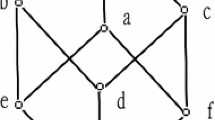Abstract
As we have recently emphasized elsewhere (W. A. Sedelow & S. Y. Sedelow, 1993b), Knowledge Delivery globally at least compares with Health Care Delivery in social importance--which is to say that internationally it is one of the salient social problems of the present day. At this Conference we are concerned, by way of current and prospective interactions between research and researchers in the domains of Knowledge Discovery and of Rough Sets, to make technical contributions to the alleviation of that problem. Knowledge, it goes without saying, always has been in shorter supply than needed; but now the deficit in available, delivered knowledge has become an overriding concern around the world, in no small measure owing to the disarray in human lives occasioned by widespread disruption in more or less traditional and systemic relationships (W. A. Sedelow & S. Y. Sedelow, 1993a), thereby creating a necessity for working through to solution more problems in less time than ever previously has been required of the human species.
Access this chapter
Tax calculation will be finalised at checkout
Purchases are for personal use only
Preview
Unable to display preview. Download preview PDF.
Similar content being viewed by others
Bibliography
Armstrong, D.M. 1989. A Combinatori al Theory of Possibility. Cambridge: Cambridge University Press.
Brent, Joseph. 1993. Charles Sanders Peirce. Bloomington: University of Indiana Press.
Brugman, Claudia, and George Lakoff. 1988. “Cognitive Topology and Lexical Networks,” in S. Small, G. Cottrell, and M. Tanenhaus, eds., Lexical Ambiguity Resolution, Palo Alto: Morgan Kaufmann, 477–508.
Churchland, Patricia S., and Terrence J. Sejnowski. 1992. The Computational Brain. Cambridge: MIT Press.
Grzymala-Busse, J.W. 1990. “On the Reduction of Instance Space in Learning from Examples,” Proceedings, Methodologies for Intelligent Systems, 5, 388–395. Elsevier.
Grzymala-Busse, J.W., and Sachin Mithal. 1990. “A Comparison of Four Tests for Attribute Dependency in the LEM and LERS Systems for Learning from Examples,” Proceedings, Third International Conference on Industrial and Engineering Applications of Artificial Intelligence & Expert Systems, Vol. II:949–958. ACM. 60
Grzymala-Busse, Jerzy W., and Soe Than. 1993. “Data Compression in Machine Learning Applied to Natural Language,” Behavioral Research Methods* Instrumentation,and Computers, 25:2, 318–321.
Old, John. 1993. “Image Schemas and Lexicons: A Comparison Between Lexical Networks,” Proceedings, Fifth Midwest Artificial Intelligence and Congitive Science Society Conference, ed. Thomas Ahlswede, Central Michigan University.
Pawlak, Zdzislaw. 1982. “Rough Sets,” International Journal of Information and Computer Science. 11: 341–356.
Sedelow, Sally Yeates. 1987. “An Interlingual Communication Support System (ICSS) Example Re Chinese/English Classroom Instruction,” Proceedings, Methods III, International Conference on Foreign Language Teaching, University of Northern Iowa, Cedar Falls, 115–120.
Sedelow, Sally Yeates, and Walter A. Sedelow, Jr. 1986a. “The Lexicon in the Background,” Winfred Lehmann, ed., Computers and Translation, I:2, 73–81.
Sedelow, Sally Yeates, and Walter A. Sedelow, Jr. 1992. “Recent Model-Based and Model-Related Studies of a Large-Scale Lexical Resource,” Proceedings, COLING-92 [14th Biennial Conference for The International Committee on Computational Linguistics; Nantes], 1223–1227.
Sedelow, Walter A., Jr. 1968. “History as Language,” Computer Studies in the Humanities and Verbal Behavior, 1 (4).
Sedelow, Walter A., Jr. 1991. “Human Computing in a Neurosciences Perspective: Implications for MT [Machine Translation] in Europe, Proceedings, 15th Annual European Studies Conference; University of Nebraska/Omaha; 336–339.
Sedelow, Walter A., Jr. 1988. “Knowledge Retrieval from Domain-Transcendent Expert Systems: I. Some Concepts from Cognitive Robotics,” Proceedings, 51st Annual Meeting of the American Society for Information Science, 25: 205–208.
Sedelow, Walter A., Jr. 1992. “Petri Nets for Coordinating Studies Across University and National Boundaries in the Pacific Region,” Proceedings, Pacific Telecommunications Conference, ed. Lofstrom and Wedemeyer, Pacific Telecommunications Council, Honolulu; 258–265.
Sedelow, Walter A., Jr. and Sally Yeates Sedelow. 1992a. “Artificial Intelligence, A New Tack,” Proceedings, Martha Evens, ed., Fourth Midwest Artificial Intelligence and Cognitive Science Society Conference, Illinois Institute of Technology, 122–130.
Sedelow, Walter A., Jr. and Sally Yeates Sedelow. 1994. “Graph Theory, Set Theory, and Order Theory in Semantic Space Analysis for Use in Knowledge Representation,” Proceedings, World Congress on Expert Systems ‘84 [Estoril/Lisbon]. (In Press.)
Sedelow, Walter A., Jr. and Sally Yeates Sedelow. 1993a. “Interlinguae,” Proceedings, International Conference on Computing and Information [Sudbury, Ontario], IEEE Press. (In Press.)
Sedelow, Walter A., Jr. and Sally Yeates Sedelow. 1993b. “Multicultural/Multilingual Electronically-Mediated Communication.” [1993 Conference on Computing for the Social Sciences: “Grand Challenges for the Social Sciences.” National Center for Supercomputing Applications, University of Illinois].
Sedelow, Walter A., Jr. and Sally Yeates Sedelow. 1987. “Semantic Space,” Winfred Lehmann, ed., Computers and Translation, 2: 231–242.
Shearer, Kenneth D. 1986. “The Geolinguistics of Information: English vis-a-vis Other Major Languages,” International Library Review, 18: 223–230.
Wille, R. 1990. Concept Lattices and Conceptual Knowledge Systems. Preprint Nr. 1340, Darmstadt: Technische Hochschule.
Author information
Authors and Affiliations
Editor information
Editors and Affiliations
Rights and permissions
Copyright information
© 1994 British Computer Society
About this paper
Cite this paper
Sedelow, W.A., Sedelow, S.Y. (1994). Knowledge Recognition, Rough Sets, and Formal Concept Lattices. In: Ziarko, W.P. (eds) Rough Sets, Fuzzy Sets and Knowledge Discovery. Workshops in Computing. Springer, London. https://doi.org/10.1007/978-1-4471-3238-7_7
Download citation
DOI: https://doi.org/10.1007/978-1-4471-3238-7_7
Publisher Name: Springer, London
Print ISBN: 978-3-540-19885-7
Online ISBN: 978-1-4471-3238-7
eBook Packages: Springer Book Archive




